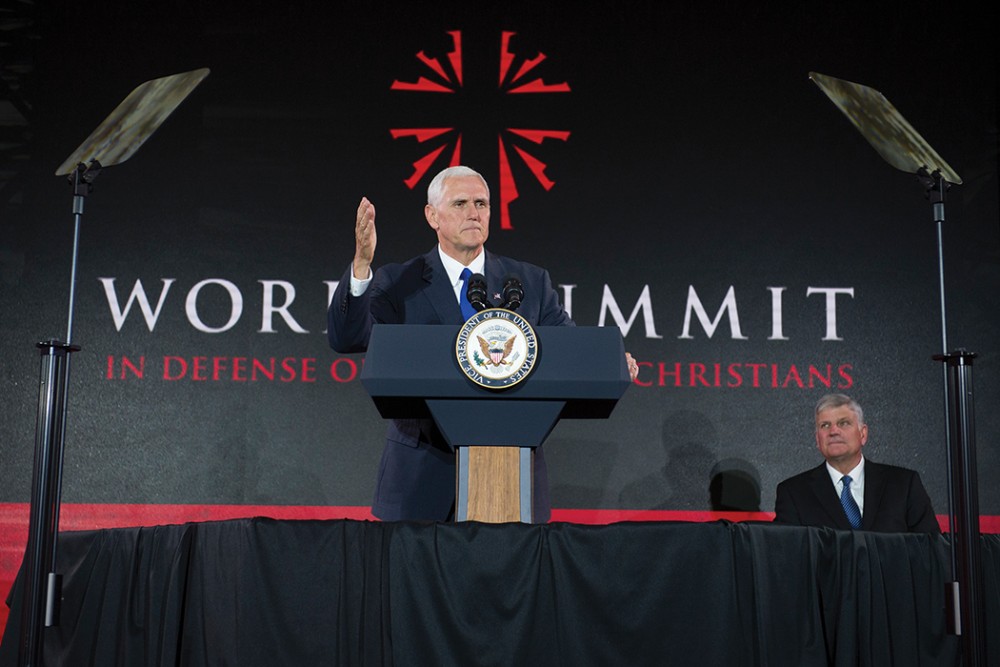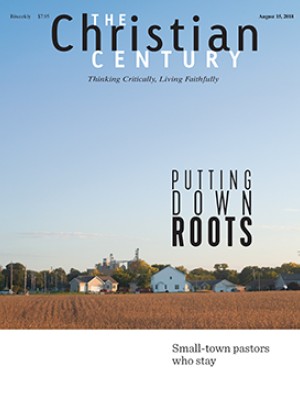The unexpected relationship between U.S. evangelicals and Russian Orthodox
Under Trump and Putin, a strange alliance gets stranger.

Well before special counsel Robert Mueller started investigating possible illegal collusion between the Trump campaign and the Russian government, American evangelicals had formed an odd alliance of their own with leaders of the Russian Orthodox Church. American evangelicals are led to make common cause with Russian Orthodoxy—and with Donald Trump and Vladimir Putin—because of a deep and shared suspicion of Western liberal elites.
Evangelical leaders in the United States and Orthodox hierarchs in Russia have accused the Western liberal establishment of being secular, antireligious, and committed to undermining traditional religious and moral values. In recent years, Barack Obama’s comments about “bitter” people “who cling to guns or religion” and Hillary Clinton’s dismissal of the “deplorables” backing Trump have added fuel to the flames. Sexual and gender politics have generated the most heat, but “traditional values” have also included patriotism, respect for the military, and the celebration of historic religious national identities, as in “Christian America” or “Holy Russia.”
Read our latest issue or browse back issues.
In both countries, evangelicals and Orthodox have actively opposed legalized abortion and have called for protection of the “traditional” family. They have turned to leaders who support their causes—American evangelicals to the Republican Party and now Trump; Russian Orthodox hierarchs to Putin.
On this basis, for more than a decade, Russian Orthodox hierarchs—especially Patriarch Kirill and Metropolitan Hilarion—have explored cooperation with American evangelicals and other conservative religious forces both in Russia and internationally. Metropolitan Hilarion, the church’s top diplomat, recently asserted that Russian Orthodox believers and Russian Baptists agree on the need to preserve “traditional Christian values and the institution of the family.” At a gathering of religious leaders in England last year, Patriarch Kirill appealed for a united effort to counter the “oppression” of “power groups” that propose ideas “incompatible with the traditional views of Christian morality. . . . Christians in Europe must strive to defend their values on which the continent was built.” This language echoes that of John Paul II and Benedict XVI, who also called for preserving the Christian foundations of Europe.
Metropolitan Hilarion has traveled regularly to the United States to meet not only with Orthodox counterparts but also with conservative evangelical and Catholic leaders. On a 2011 trip, he delivered a speech at the Catholic University of America, perhaps the most conservative of America’s large Catholic universities, and then at Dallas Theological Seminary, one of the country’s most prominent conservative evangelical institutions. While in Dallas, he preached at Highland Park Presbyterian Church, a 4,000-member congregation that has since left the Presbyterian Church (U.S.A.) over its liberal social stances.
Metropolitan Hilarion also met privately with politically conservative Texan business leaders and visited former president George W. Bush on his ranch near Waco. In 2014, Metropolitan Hilarion returned to the United States to speak at a conference of Christian leaders organized by Franklin Graham (now head of the Billy Graham organization), after which he attended Billy Graham’s 96th birthday party and met with Tim Keller, the evangelical pastor of Redeemer Presbyterian Church in New York City.
The alliance between the Russian Orthodox Church and the Billy Graham Evangelistic Association has been especially significant. In 2015, Metropolitan Hilarion invited Franklin Graham to Moscow, where he had private audiences with Patriarch Kirill and Putin. Graham later thanked the patriarch for the Russian Orthodox Church’s “strong voice in the defense of moral values” and lauded Putin for defending biblical values “from the attacks of secularism.” Graham further asserted that many Americans wished that someone like Putin could be their president, and he praised Russia for passing antigay propaganda laws.
The visit bore more than rhetorical fruit. Graham announced that Samaritan’s Purse, a ministry of the Billy Graham Evangelistic Association, would cooperate with the Russian Orthodox Church in providing material assistance to people fleeing violence and war in eastern Ukraine, where Russia has supported an insurgency against the U.S.-supported Ukrainian government.
In addition, Franklin Graham and Metropolitan Hilarion agreed to organize a World Summit in Defense of Persecuted Christians. Among those whom they wished to defend were Christians in Syria, where Orthodox Christians, historically 10 percent of the population, have felt relatively secure under the regime of Bashar al-Assad, whom the Russian government has strongly supported, despite his murderous policies against his political opponents. The Russian Orthodox have an acute sense of their own persecution under Soviet communism, and the church has canonized nearly 2,000 “new martyrs and confessors.” Graham has said that “no church in modern history has suffered more than the church in Russia.”
The summit was originally scheduled for Moscow, but in the summer of 2016 Franklin Graham announced that it would be moved to Washington, D.C., in response to new Russian antiterrorism laws that severely restrict the kind of public proselytization that Protestant evangelicals (including those in Russia) consider essential to their faith. Graham added that the summit was all the more important as a means of lifting up persecuted Christians in today’s Russia; indeed, in April 2017, the Russian government banned the Jehovah’s Witnesses, a move that the Russian Orthodox Church did not publicly support but also did not protest. Russian evangelicals worried that they could be next. President Putin and Russian Orthodox hierarchs had their own reasons for moving the summit to Washington: to protest Western sanctions against Russia, which have only intensified since the election of Trump and which, along with low oil prices, have depressed the Russian economy and posed a potential threat to popular support for Putin.
The summit took place in May 2017, with the Billy Graham Evangelistic Association spending $4 million to gather 600 Protestant, Catholic, and Orthodox participants from 136 countries. The oddities of the Trump, Putin, American evangelical, and Russian Orthodox alliance were on full display, with the Russian Orthodox delegation staying at the Trump International Hotel. Vice President Pence addressed the summit on the first day and met privately with Metropolitan Hilarion on the sidelines. In his keynote address, Metropolitan Hilarion connected “traditional moral values” and “persecution,” warning that while Christians in the West may not yet suffer physical violence for their faith, they increasingly experience social opposition and even discrimination because of their positions on abortion, sexuality, and euthanasia.
When Billy Graham died eight months later, both Patriarch Kirill and Metropolitan Hilarion sent official letters of condolence. Metropolitan Hilarion noted that Billy Graham commanded “respect in the Orthodox Church and in the whole Christian world by his uncompromising stand for the truth of Christ.” “Whereas many in the West began to reject the biblical view of marriage and morality, Billy Graham always boldly and resolutely asserted it on all possible platforms.” In addition, the Russian Orthodox Church sent a representative to the funeral service in Charlotte.
Since the world summit, U.S.-Russian relations have deteriorated further in several respects. Mutual expulsions of diplomatic staff have hurt the processing of visas, especially for Russians, who now wait as long as six months for an appointment at the American embassy in Moscow. The two countries are still squaring off over Ukraine and Syria.
But the unlikely alliances between Trump, Putin, American evangelical leaders, and Russian Orthodox hierarchs continue. During the World Cup soccer tournament, Russia allowed dozens of evangelical churches to open their doors for the equivalent of Super Bowl parties, a move that encouraged American evangelicals. At their meeting in Helsinki on July 16, Trump promoted his friendly relations with the Russia president against the advice of most foreign policy experts in the U.S. Evangelicals continue to support Trump, just as the Russian Orthodox Church remains firmly behind Putin. Evangelicals and Russian Orthodox leaders are likely to continue to make common cause in defense of traditional values and persecuted Christians.
During the Cold War, the World Council of Churches represented one of the few international forums in which Western and Russian Christians could regularly meet. Today, Franklin Graham and Metropolitan Hilarion maintain the most significant ecumenical contacts between American and Russian Christians. They believe that their relationship can help the U.S. and Russian governments bridge their divides. But such alliances always come at a cost. In the Cold War days, Russian Orthodox delegations consistently but hypocritically praised their government for protecting freedom of religion and pursuing peace. They never spoke of its abuses, nor did WCC leaders. Maintaining the relationship, they claimed, was the first priority. Billy Graham took a similar approach when he conducted evangelistic crusades in the Soviet Union in the 1980s. As one commentator has said, Graham wanted to use whatever space he had to be an evangelist, and being a prophet would have closed that space.
Whether the current evangelical-Russian Orthodox coalition rests on anything more than political expediency remains to be seen. On the Christian side, the language of traditional values is slippery. While there may be much that Christians through the centuries have been able to agree upon, issues of sexuality, gender, and war require ongoing theological reflection and clarification—and evangelicals and Orthodox start from very different places. Moreover, appeals to traditional values tend in practice to marginalize non-Orthodox religious groups in Russia and nonevangelical believers in the United States—as in the all too common Orthodox attitude that Russian Protestants and Catholics are not quite Russian or in American evangelical suspicions of Muslims.
The greatest peril that the churches face in forging these alliances is political co-optation. While the historical influence of Christianity on both American and Russian culture has been profound, the gospel is not first of all about stabilizing national identity or securing national pride. As Georgii Orechanov, a prominent Russian Orthodox priest, wrote recently, the Orthodox Church has too often cozied up to the state and failed to secure freedom of conscience. In contrast, the church has been at its best when it “strengthened what [is] best in the Russian people—humility, the capacity for sacrifice and for enduring inhumane living conditions, [and] the ability to show heartfelt compassion and to forgive enemies.” These too are traditional values and, indeed, values that the Russian Orthodox Church has lifted up by honoring those Christians who in the 1920s and ’30s refused to see their Bolshevik persecutors as enemies but rather called them back to the mercy, compassion, and love that all Russians, according to the church, share by virtue of their Orthodox heritage.
The Russian Orthodox Church currently demonstrates little ability to publicly challenge Putin’s moves to eliminate meaningful political opposition in Russia and his failure to protect opposition figures such as Alexei Navalny from physical violence. Conservative evangelicals have avoided confronting Trump about his abusive language and demeaning behavior toward people with whom he disagrees, even within his own administration.
The great 20th-century Swiss theologian Karl Barth regularly asserted that Christians will generally “swim against the stream” of dominant social ideologies, whether liberal or conservative. Both American evangelicals and Russian Orthodox hierarchs could do much more to resist the unjust policies and totalitarian tendencies of their respective presidents and to move their nations—and churches—to self-examination, humility, and repentance.
A version of this article appears in the print edition under the title “Moscow connection.”






